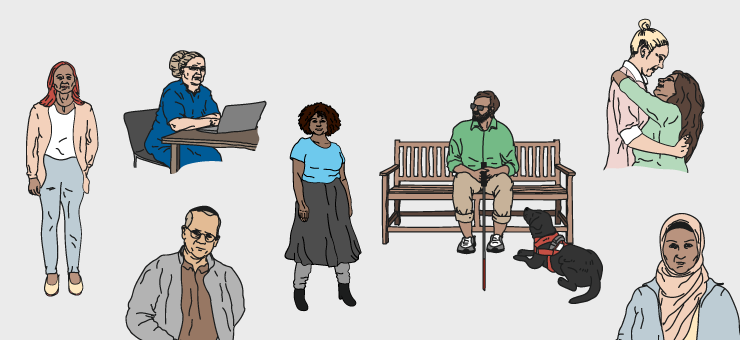Discrimination
Last updated: 24/5-2023
This text is about discrimination. Discrimination is when someone is treated worse than others. Sometimes we can feel that we have been treated unfairly without it being discrimination.

This text describes what sort of treatment amounts to discrimination. It also describes what help is available if you have been subjected to discrimination.
What is discrimination?
If you get worse treatment than others because of your gender or your skin colour, for example, that is known as discrimination. Discrimination against someone is a violation of their human rights. That is why discrimination is prohibited.
Here are some examples of what can be regarded as discrimination:
- An employee tells her boss that she is pregnant, and he terminates her probationary employment.
- A woman is not allowed to make a doctor's appointment because she is wearing a veil.
- A boss does not want to interview a job applicant with a foreign name.
- A teacher questions a pupil because he is wearing a dress.
- The staff in a café refuse to read out the menu to a guest who cannot see what it says due to impaired vision.
- A woman is harassed in her workplace because she is married to a woman.
- A boss does not want to interview a job applicant who is over 50 years old.
- A dark-skinned person is refused entry to a restaurant while at the same time light-skinned people are allowed to enter.
Umo.se has a video about discrimination. It is available in Swedish, Arabic, Dari, English, Somali and Tigrinya.
The Discrimination Act (Diskrimineringslagen)
There is a specific law that prohibits discrimination, called diskrimineringslagen, or the Discrimination Act. This law prohibits employers, organisations, and education providers from treating some people worse than others. Education providers are schools, for example.
You may feel unfairly treated without the reasons amounting to discrimination in the sense of the law.
Discrimination is prohibited by law if it is due to one or more of these grounds for discrimination:
- Gender: Sweden has two legal genders – woman and man. The prohibition against treating someone worse due to their gender also includes people who plan to or already have changed their gender.
- Gender identity: Gender identity is about physical appearance, including clothes and body language. It is not connected with the body you have but to which gender you feel you belong.
- Ethnicity: A person's country, ethnic group, skin colour, and native language are referred to as their ethnicity in the law. Every person has one or more ethnicities. Treating people worse than others due to their ethnicity is racism.
- Religion or other belief system: Judaism, Christianity, and Islam are examples of religions. Atheism is among other belief systems. A person who is an atheist does not believe in any god whatsoever.
- Functional impairment: If a person has a functional impairment, it means that the person may have greater difficulties than others moving around, hearing, or understanding information.
- Sexual orientation: Your sexual orientation is a description of which genders you are attracted to or fall in love with. The law includes homosexual, heterosexual, and bisexual orientations.
- Age: People may not be treated worse than others due to their age.
In many cases, people are discriminated against on the basis of several grounds. An example of this is if a woman with a given religious faith feels discriminated against on the basis of her gender as well as her religion.
If you are treated badly by a private individual – say your neighbour or a classmate – the Discrimination Act does not apply. But the person's behaviour may be illegal on other grounds. What is the difference compared to the examples above?
Get help
You can get help if you find that you are being discriminated against.
- You can get advice and support from an anti-discrimination agency if one is available where you live.
- If the discrimination occurs in your workplace, you can speak to your manager or your health and safety representative. Your employer has to investigate the issue and work towards preventing discrimination in the workplace.
- If it happens in your workplace and you are a member of a trade union, the union can help you.
Anti-discrimination bureaus
There are various local and regional anti-discrimination bureaus in Sweden. They can provide advice and support to you if you have been subjected to discrimination.
Diskrimineringsombudsmannen – the Equality Ombudsman
Diskrimineringsombudsmannen (DO), or the Equality Ombudsman in English, is a government agency that monitors compliance with the Discrimination Act. If you have been subjected to discrimination, you can send a tip-off or a complaint to DO.
DO uses tip-offs and complaints to ensure that the act is complied with, not to resolve discrimination issues of private individuals.
Hate crime
If someone commits a crime against people simply because they belong to a certain group, this is known as a hate crime. In other words, a crime is a hate crime if the perpetrator's motive is hatred or prejudice based on one of the seven grounds for discrimination. It does not matter if the person who is the victim of the crime belongs to the targeted group or not. It is the motive of the perpetrator that determines if the crime is a hate crime. The perpetrator will be given a harsher sentence if the crime was motivated by hatred.
Hate crimes violate human rights and are prohibited in Sweden. If you become the victim of a hate crime, you should report it to the police.



